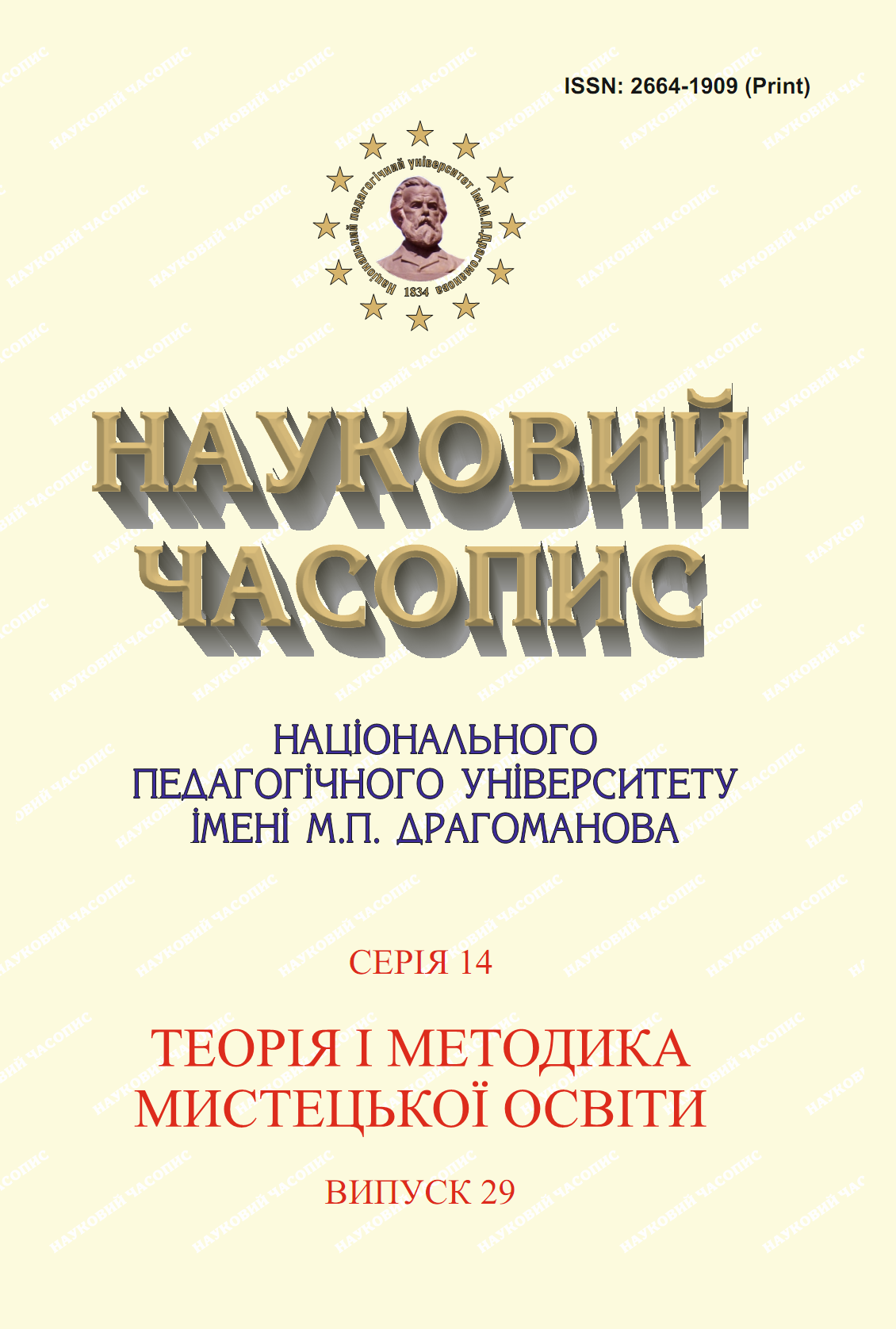Interdisciplinary integration as a factor in the professional training of the future music teacher
DOI:
https://doi.org/10.31392/NPU-nc.series14.2023.29.06Keywords:
professional training, music teacher, interdisciplinary integration, vocal and choral workAbstract
The article is devoted to the problem of professional training of the future music teacher. It is noted that vocal and choral activity is a priority type of activity in secondary education institutions, which is "genetically" close to Ukrainian musical education. In order to continue the traditions of the national choral art, the task of the music teacher and choir master is defined - work with a choir or vocal ensemble. The range of creative problems of the choir master is substantiated (organization of the creative team, development of vocal and choral skills, work on studying the repertoire, performance skills). The range of professional competencies of a teacher-choirmaster has been clarified: general pedagogical, conducting, vocal, instrumental, performing, musicological, research. The purpose of the article is determined - to substantiate the effectiveness of the implementation of interdisciplinary integration in the process of professional training of the future music teacher. Interdisciplinary integration is considered as a pedagogical means of forming the professional competences of future music teachers based on the interpenetration of various educational disciplines ("choral conducting", "voice production", "choral class", "solfeggio", "acting skills", etc.).The tasks of the educational disciplines are defined: "voice production" involves knowledge of the basics of vocal technique, mastery of the singing voice, mechanisms of voice production (singing breathing, correct sound production, diction, timbre, dynamics, strokes); the goal of "solfeggio" is the development of musical hearing, intonation and musical memory, musical imagination, thinking, self-control over their performance in the choir class; "choir class" - a school of choral singing, where students develop vocal and choral skills, correct singing, singing breathing, accuracy of intonation, vocal hearing, sense of the ensemble, choirmaster skills, ability to work with a choral piece; "acting skills" teaches students to create concert scenarios, art projects, learn the laws of musical drama, master the methods of combining words, plastic, music, light, etc. The conclusions emphasize the importance of interdisciplinary integration for the productive performance of creative work by music teachers in secondary education institutions and extracurricular art institutions.
References
Белінська Т.В., Кравцова Н.Є., Дабіжа К.Л., Плакидюк О.Ю. (2021) Психолого-педагогічні умови формування професійної компетентності майбутніх учителів музичного мистецтва засобами міждисциплінарної інтеграції. Науковий часопис Національного педагогічного університету імені М.П. Драгоманова. Випуск 80. С. 26-29.
Белінська Т.В., Кушнір К.В., Білозерська Г.О., Сізова Н.С.(2020) До проблеми впровадження інтегрованого підходу в процес викладання вокально-хорових дисциплін у ЗВО. Інноваційна педагогіка: Теорія і методика професійної освіти. Одеса, «Гельветика». Випуск 25. Т. 2. С. 16.
Василевська-Скупа Л.П. (2014) Формування комунікативної компетентності майбутніх учителів музичного мистецтва : [монографія] - Вінниця : ТОВ фірма «Планер». – 225с.
Гаврилюк О. А. (2019) Формування професійної готовності майбутніх учителів музики у педагогічних коледжах до художньотворчої діяльності : дис. … канд. пед. наук : 13.00.04. Вінниця. 294 с.
Енциклопедія освіти / гол. ред. В. Кремень (2008) Акад. пед. наук України. Київ : Юрінком-Інтер,. 1040 с.
Рудницька О. П. (2005) Педагогіка: загальна та мистецька : навчальний посібник. Тернопіль : Навчальна книга – Богдан. С. 34.
Швець І. Б. (2012) Формування креативної особистості майбутнього вчителя музики засобами театрального мистецтва. Наукові записки Вінницького державного педагогічного університету імені Михайла Коцюбинського. Серія : Педагогіка і психологія. № 36. - С. 391-395
Downloads
Published
Issue
Section
License
Copyright (c) 2023 Scientific journal of National Pedagogical Dragomanov University. Series 14. Theory and methodology of arts education [ Naukovij časopis NPU ìmenì M.P. Dragomanova. Serìâ 14. Teorìâ ì metodika mistecʹkoï osvìti ] ISSN:2664-1909

This work is licensed under a Creative Commons Attribution-NonCommercial-ShareAlike 4.0 International License.

